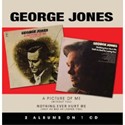
George Jones
A Picture of Me – Nothing Ever Hurt Me
American Beat Records
Listen, no one can belt out a country weeper like George Jones. Not Gram Parsons, not Merle Haggard, not Waylon Jennings. Hell, he burrows into the everyday traumas and banalities of romantic dissolution with a flair for the dramatic that would shame longtime partner Tammy Wynette and Music Row divas like Loretta Lynn and Jesse Coulter. This is the fella, after all, who drove a lawnmower miles into town after Wynette flushed his keys down the toilet, so desperate was he to get completely fucking blotto. It’s amazing to me that this guy didn’t inspire the same suicide-watch concern that Ian Curtis did at his mordant peak. Have you ever seen the album cover of him sitting in an empty diner nursing a milkshake and heartbreak? Even Morrissey would hesitate at that gambit. And yet Jones can still stride out onto the Grand Ole Opry stage, with his bizarrely perfectly coiffed golden hair and a full-on denim suit, sing a set of absolutely devastated love songs belying incredible vulnerability, and still dare anyone to step outside for a fight. Interesting set of contradictions is all I’m saying.
By 1973, Jones was miles away from the fresh-faced, ducktailed lad on the cover of his earlier records – his voice and performances had matured into something incredibly smooth and poised, but still possessed an edge of rawness and wildness that lent him that extra edge. In the midst of a fruitful partnership with country producer Billy Sherrill, Jones knocked out both of these albums in the space of one year. Both critical successes and now combined into one album, it makes the accomplishment even more stunning when considering how most “artists” couldn’t manage twenty good songs in a lifetime, much less a single year. These albums are a vivid reminder of a country music long gone; these aren’t the Walmart-shoppin’, church-goin’, snivellin’ milquetoasts of modern focus-group country. The sound and performance is vintage and analog, like a fine wine. Well-produced but intimate, minimalist waltz-time twang either gently lopes along to Jones’ teary narratives or skips along like gleaming rockabilly in the rare upbeat numbers. Jones’ vocals are reverbed “just so” for that extra punch, like the distant nostalgia of a lonely sunset. Sherrill was a fucking deft hand.
Most of the songs follow the same themes: love slowly dissolving, she’s leaving him, he’s leaving her, not with a bang, but with a whimper and a tear. Jones somehow remains shit-kicking tough while continually putting himself in the most vulnerable of positions, taking his share of the blame, facing up to the truth bravely, while still seeming unsure that he really wants to go on living. Sometimes the premises are a little treacly (there’s one where he tries to court an old love with flowers, showing up unannounced, but it turns out he’s bringing flowers to her funeral, and then he has a surreal coffin-side conversation with her – zing!), but too often the unflinching details of love lost and lost and lost hit far too close to home. The songs are top notch and Jones is at the top of his game. His smooth and honeyed baritone serves as the perfect conduit for all of the built-up frustrations and torments within. The glaring exception is “You’re Looking At A Happy Man” where Jones wakes up to find his love is not laying beside him, and… he whoops for joy. How can you not love a song where Jones rejoices “there ain’t a nekkid woman in sight”? Best of the mopes include “A Picture of Me (Without You),” “Mom and Dad’s Waltz,” “Wine (You’ve Used Me Long Enough),” and “Tomorrow Never Comes.”
American Beat/Collectors’ Choice: http://www.ccmusic.com












